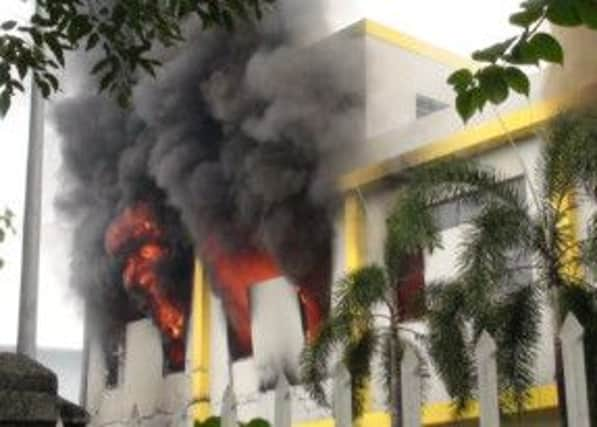Anti-China protesters burn Vietnam factories


The unrest at industrial parks close to Ho Chi Minh City was the most serious outbreak of public disorder in the tightly controlled country in years.
Vietnam faces the challenge of trying to manage public anger directed at China while itself pressing Beijing to recognise its territorial rights to a disputed area of the South China Sea.
Advertisement
Hide AdAdvertisement
Hide AdVietnam has sent ships to confront the rig and they are engaged in a tense stand-off with Chinese vessels protecting it.
The rioting, which began on Tuesday and continued into yesterday, in Binh Duong province followed protests by up to 20,000 workers at the industrial parks.
Gangs of men attacked factories they believed were Chinese-run, but many were Taiwanese or South Korean, officials said.
By yesterday morning, gangs riding motorbikes remained on the streets and factories remained closed.
Police said 440 people had been detained over the arson attacks and looting.
Taiwanese-owned sports shoe manufacturer Yue Yuen, which produces trainers for Nike, Adidas and Reebok, said it had closed its three complexes close to Ho Chi Minh City as a precautionary measure.
“We believe that this should be solved very soon, that somehow ultimately it will be up to the government to guide sentiment,” said company spokesman Jerry Shum.
One eyewitness, a security guard, said looters stormed his factory at 1am and took computers and anything valuable.
Advertisement
Hide AdAdvertisement
Hide Ad“The whole industrial zone looks like it was just smashed by a typhoon,” he said.
The government claimed the protests were initially peaceful but were hijacked by “extremists” who incited people to break into the factories.
It said at least 15 factories were set alight and hundreds more vandalised or looted.
China’s foreign ministry and embassy in Hanoi issued warnings to Chinese citizens and urged Vietnam’s government to protect them.
The embassy said it saw no end to attacks by what it called anti-China forces and urged Chinese to take safety precautions and avoid unnecessary travel.
Low wages have attracted foreign investors from across the world to Vietnam in recent years.
In 2013, Chinese invested $2.3 billion (£1.3bn), a sharp rise from the previous year, according to Beijing officials.
China is also Vietnam’s biggest trading partner, exporting billions of dollars of materials each year for factories producing goods including clothes, shoes and smartphones.
Advertisement
Hide AdAdvertisement
Hide AdVietnam reacted angrily after China towed a deep-sea oil rig on 1 May close to the Paracel Islands, which are controlled by China but claimed by Hanoi.
It sent a flotilla of vessels to try to disrupt the oil rig. Some Vietnamese boats clashed with Chinese ships sent to protect the rig, raising fears of a possible conflict.
“We urge Vietnam to stop all provocative actions, come to their senses, and stop all acts intended to create disturbances,” Chinese foreign ministry spokeswoman Hua Chunying said.
The stand-off underlines China’s aggressive pursuit of its territorial claims despite complaints from smaller nations such as Vietnam and the Philippines, which also claim parts of the waters. The United States, a treaty ally of the Philippines, has called the latest Chinese action “provocative”.
Over the weekend, the Hanoi government gave rare permission for street protests against China in cities across Vietnam. The protests were covered by the state media, unlike the ones on Tuesday, which appear to have been hit by a media blackout.
The ruling communist parties in China and Vietnam maintain close links and until 1 May had been trying to handle tensions over the territorial disputes quietly.